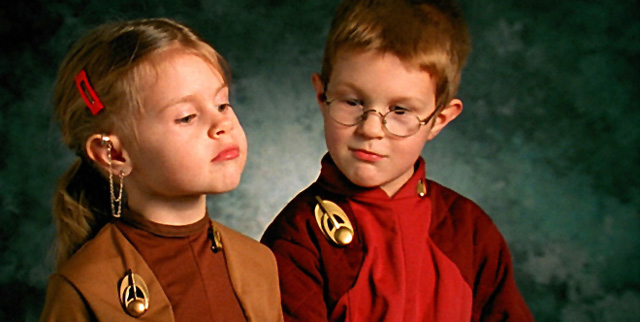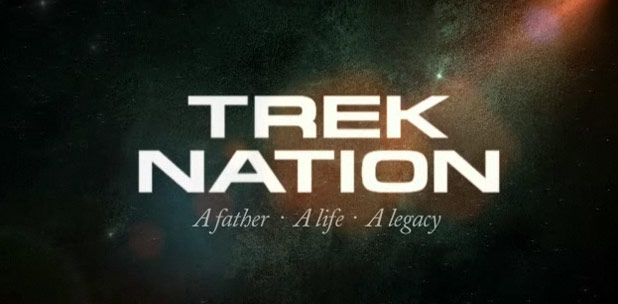The documentary Trek Nation debuted on the Science Channel on November 30, presenting an interesting personal quest to understand the life and legacy of Gene Roddenberry. While many books and television programs have been done exploring Roddenberry and the Star Trek phenomenon he created, the unique aspect of Trek Nation comes in the form of its producer and perspective. This program is done from the perspective of Eugene “Rod” Roddenberry, the son of Gene Roddenberry, who died when Rod was only 17. By his own admission, Rod was not close to his father and experienced teenage rebellion, and although Star Trek impacted the lives of hundreds of thousands if not millions of people around the world, Rod was not a fan of the show while his father was alive. This documentary details the struggles of a son to understand a father through the eyes of those who knew and worked with him, and the fans who continue to venerate him.
Given the high esteem in which Gene Roddenberry is held by his fans, and the place he holds in pop culture history, one might expect that Trek Nation would present a glossy picture of its subject matter, but this is not the case. He is presented with all of his faults as well as his successes, even if at times members of the Roddenberry family and his former working colleagues are reticent to discuss the challenges of living and working with the television visionary and writer.
Two of the interviews in the film were especially noteworthy. In one instance Rod sat down with George Lucas to ask about the possible influences of Star Trek on his Star Wars phenomenon. Portions of this segment seemed a little awkward as Lucas acknowledged commonalities but emphasized vast differences between the two franchises, with one a science fiction television program emphasizing thoughtful storylines, and the other a space opera emphasizing action. At the conclusion of this interview Rod asked Lucas about his thoughts on the Star Trek vs. Star Wars battles that fans wage on the Internet (perhaps taken to new extremes with the web video battles between William Shatner and Carrie Fisher). Lucas downplayed such conflicts, said that he did not follow fan websites, and that the outcomes of such disputes are purely subjective. Another interesting segment came with the concluding interview with J.J. Abrams on his Star Trek film franchise reboot. Like Rod, Abrams was not a fan of the original series or the franchise which it birthed, and it was only after taking on the project that he discovered the significance of what it represents. Here both Abrams and Rod Roddenberry came to an appreciation of Roddenberry and his creative legacy decades after many in popular culture had found something significant in the work.
An interesting tension is described in the documentary that arose as a result of the death of Roddenberry in 1991. During this time Star Trek: The Next Generation was in production, and it fell upon Rick Berman to assume the creative mantle for the program. During his work on ST:TNG, Roddenberry’s optimistic humanism demanded that the future portray characters who had evolved beyond the conflict that had plagued much of human history. This presented a great challenge to writers since stories often revolve around the conflict among its characters. After Roddenberry’s death the writers for ST:TNG hoped that this restriction would be lifted, but Berman felt compelled to maintain Roddenberry’s initial vision. Yet even with Berman’s creative control giving deference to Roddenberry’s vision, eventually the writers were given room to explore conflict between characters and new subject matter that made for a very different, and some would say better, ST:TNG post-Roddenberry.
One of the elements that Roddenberry wanted to develop in the ST:TNG series was his distaste for various “superstitions” or religions which have so often been the source for conflict and war in human history. This is perhaps best exemplified in the ST:TNG episode “Who Watches the Watchers” where Captain Picard says, “Millennia ago, they abandoned their belief in the supernatural. Now you are asking me to sabotage that achievement, to send them back into the dark ages of superstition and ignorance and fear? NO!” Yet despite Roddenberry’s strong disapproval of religion, ST:TNG was often ambiguous about its portrayal of religion and culture, demonstrating a shift from Star Trek‘s original cultural context of modernity and the shift to postmodernity in ST:TNG. With each succeeding series in the Star Trek franchise spirituality would continue to play a part, perhaps best exemplified in the religion of the Bajorans in Star Trek: Deep Space Nine. (See Douglas Cowan’s discussion of this in the chapter “Heeding the Prophets’ Call: Star Trek: Deep Space Nine,” in Sacred Space: The Quest for Transcendence in Science Fiction Film and Television [Baylor University Press, 2010]).

Unfortunately, Trek Nation only briefly touches on elements that could have been explored in more depth in an effort to understand why Star Trek‘s philosophy has struck so deep a chord with many fans. At one point mention is made of the optimistic vision of the franchise as crystallized in the IDIC ethic, which stands for Infinite Diversity in Infinite Combination. Scholars like Jennifer Porter have argued that this is the “root paradigm” of Star Trek wherein a cosmos of diverse beings with differing practices, beliefs, and perspectives are valued and co-exist in harmony (though this ethic frequently fails to play out practically in any number of episodes of Star Trek in its various manifestations). Trek Nation could have explored the significance of the IDIC ethic in more depth, and how some have argued that this functions as a secular form of spirituality or religion (as argued by Michael Jindra) with many fans undergoing the ritual of pilgrimage through convention attendance experienced as transformational festivals. Had this aspect of Roddenberry’s legacy been explored in more depth it would have made for a fascinating piece of television as viewers wrestle with how a noted secular humanist has left a pop culture phenomenon that functions as a piece of sacred mythology for thousands of people.
Trek Nation is a documentary that adds to our exploration of a piece of pop culture that wile seemingly out of energy a few years ago with the cancellation of Enterprise, now has new life and a new generation of fans with Abrams’ Star Trek film. In 2011, Having celebrated 45 years of adventure and exploration of the universe, Trek Nation helps reinforce the significance of Star Trek as a major television and pop culture influence of the 1960s, rightfully enshrined with The Twilight Zone as some of the best television writing of the period that holds up decades later.
Related posts:
“Star Trek Fandom as a Religious Phenomenon?”
“Star Trek Conventions as Sacred Pilgrimage”
“Fan Culture Documentaries: Back to Space-Con and Four Days at Dragon*Con”
“Star Trek vs. Star Wars: Criteria for Assessing ‘Better’ Science Fiction”






One Response to “Trek Nation: Documentary on a Fatherhood and Pop Culture Legacy”